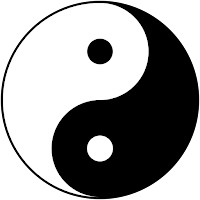Feb 1: Rhetoric of the Dao
Dear All Good People,
I think we finished last week's discussion of authorship and witnessing on the importance of our raising questions about inclusions and exclusions: In conversations about "humans," "rights," "nation," "circulation," "rhetoric," and even "history," among other things, who/what gets included or excluded, and what determines those in/exclusions?
In a way, discussing authorship and witnessing as constructs that deserve to be looked at more carefully echoes Roland Barthes's expectations of "text" and Kenneth Burke's expectations of "symbol-using," so it seems you are keenly aware that even "universal" concepts do have to be circulated and embraced in order to have authority and meaning.
When we meet on Thursday, I'll ask us to try to map Mao onto this conversation:
- What does Mao get at with the Zhuangzhi's parable of the fish? In what ways could this complement or complicate Burke's "identification"?
- What does Mao think we can gain by reflecting on our own "locus of logic and relations" (Mao 453)?
- How might absence and presence act as necessary counterparts to meaning where cross-cultural spectacles and human rights texts are concerned?
- Moreover, how does Mao encourage us to turn absence and presence into a reliable, sustainable practice (if he does)?
We'll also factor Harris's Rewriting into our discussion, as a discussion of his "moves" seems timely right now.
Finally, for convenience sake, I offer all our case study links one last time (along with a few other mini-cases we might have time to consider):
- the refereed Wikipedia article on the movement
- Amit Chaudhuri's editorial article on the movement for the UK Guardian (16 March 2016) [stable copy in Canvas in case their site is acting up]
- Facebook page for the University of Cape Town movement
- Twitter account for the Oxford University movement
- Report of South Africa's Truth and Reconciliation Commission
- "Preamble" from Universal Declaration of Human Rights
- Asmaa Mahfouz's Jan. 2011 VLOG calling fellow activists to Tahrir Square in Egypt
Note that I have extended the due date for SA3 Critical Lens Analysis to Sunday, 2/4, as a comfort and courtesy (i.e., some of you will appreciate having discussed Mao before completing the SA).
-Prof. Graban
